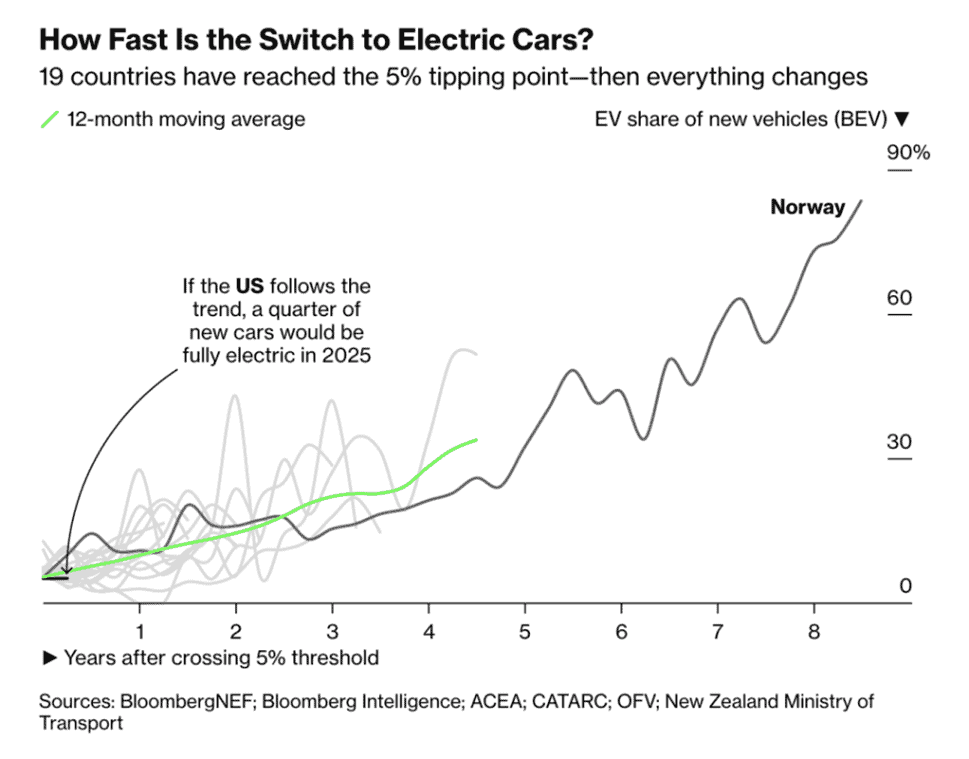As the automotive revolution rages on, the United States just reached a pivotal milestone that will send electric vehicle adoption soaring. Researchers at Bloomberg claim that once a country arrives at a 5% tipping point of new car sales being powered only by electricity, mass EV adoption is sure to follow. Their analysis found that over the last 6 months, the US crossed that threshold to join Europe and China- the other two largest car markets in the world- in moving further toward their electrification goals. The US is the latest to enter the group of 18 countries around the globe that have attained this distinction, with markets in Canada, Australia, and Spain set to do the same later this year. But what does this mean for the auto market moving forward?
Shifting Consumer Sentiment

According to the study, this achievement prefaces a period of mass EV adoption, pointing to a time when technological preferences among consumers rapidly shift. If the United States follows the path of its predecessors who have already reached the 5% tipping point, 25% of new car sales could be electric by the end of 2025, putting the country a few years ahead of original industry forecasts.
Successful innovations from the past have followed a similar S-shaped adoption curve meaning that in the early-adopter phase, sales move at a crawl and then quickly ramp up once the technology goes mainstream. And when it comes to EVs, the industry has seen this progression happen firsthand. The International Energy Agency reported that electric vehicles’ market share has tripled in the last two years, and the net growth of global car sales last year can be attributed to EVs directly.
Each country that has reached this benchmark has robust federal incentive programs and pollution rules in place that include EV tax credits, infrastructure improvements, fast charging, and more. This is also true for the US; with President Biden’s goal for the US to have half of all new vehicles sold by 2030 be zero-emission, the government and manufacturers alike are racing to ensure that our structures and standards are strong enough to support the shift. But with this race comes repercussions.
Conflicts to Follow Competition
This ahead-of-schedule projection will undoubtedly push the nation further toward our electrification goal. While this is an exciting feat in automotive history, it will also heat up industry competition as manufacturers attempt to capture consumers’ attention. Still, as a nation, we have a long way to go in terms of universal adoption; like most other countries, we are largely inhibited by a lack of EV charging station infrastructure, limited vehicle supply, dwindling lithium-ion battery materials, and lack of consumer knowledge.
While attempting to mitigate these issues, industry incumbents and start-ups will likely begin running into challenges on a multitude of fronts with regard to cybersecurity, the supply chain, intellectual property, M&As, and more. Additionally, many layoffs in the industry by big names like Tesla, Rivian, and Ford are sure to spark labor and employment conflicts, as well as theft of trade secret cases as employees move around in the market.
Nevertheless, industry growth should continue on an upward trend if historical data rings true. And since a quarter of Americans say that they will purchase an electric vehicle as their next car, all signs point to an incoming EV autocracy.
At WIT, we believe it is important to engage with experts early in the litigation process. With the legal need in the electric vehicles market expanding fast, we are working hard to continue identifying areas that will be ripe for potential disputes. Our team features industry insiders, battery technology experts, computer scientists, economists, mechanical engineers, power management specialists, and wireless technology engineers with the expertise to provide industry and academic perspectives essential to any litigation.
If your company needs help preparing for challenges surrounding the increase in electric vehicle deployment, reach out to WIT for the best experts who can advise you on your strategy. Our electric vehicles expert team was created to address what we expect to be the key areas of litigation in the move to electric fleets.




